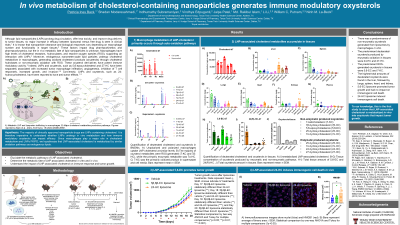Nanomedicine and Nanoscale Delivery (Focus Group - NND)
(286) In vivo metabolism of cholesterol-containing nanoparticles generates immune modulatory oxysterols

Introduction: Endogenous nanometer-scale lipid particles undergo cholesterol metabolism in macrophages, generating oxidized cholesterol products (oxysterols) that are potent immune modulators associated with certain malignancies.[1] Given that the majority of clinically approved nanoparticle drugs are lipid nanoparticles (LNPs) containing cholesterol, and macrophages play a major role in LNP uptake, it is likely that LNP-associated cholesterol is metabolized by similar oxidation pathways, explaining their immune modulatory effects. Our goal is to elucidate the metabolic pathways of LNP's cholesterol.
Learning Objectives:
- Determine the metabolic fate of LNP-associated cholesterol in vitro and in vivo.
- Evaluate the production of oxysterols from liposomes in macrophages and different body tissues.
- Understand the implication of cholesterol metabolites on immune response.
Shadan Modaresahmadi, PharmD – PhD candidate, Texas Tech University Health Sciences Center; Indhumathy Subramaniyan, MS – Sr Research Scientist, Texas Tech University Health Sciences Center; Vindhya Edpuganti, PhD – Senior Research Scientist, Texas Tech University Health Sciences Center; Jalpa Patel, BS in Pharmacy – Lead Technician, Texas Tech University Health Sciences Center; Md. Rakibul Islam, PhD – Post Doctoral Research Associate, Texas Tech University Health Sciences Center; William Putnam, PhD – Professor, Texas Tech University Health Sciences Center; Ninh La-Beck, PharmD – Associate Professor, Texas Tech University Health Sciences Center

Patricia I. Back, MS (she/her/hers)
PhD candidate
Texas Tech University Health Sciences Center
Abilene, Texas, United States

